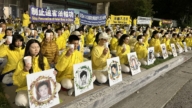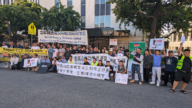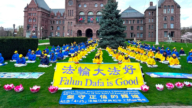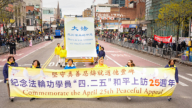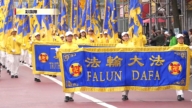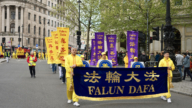【新唐人2014年04月24日訊】擊鼓鳴冤古而有之,15年前萬名法輪功學員前往中南海,要求釋放被天津當局非法關押的法輪功學員,維護憲法賦予的信仰權力。外界認為,法輪功理性和平的上訪,為中國百姓打破已經習慣的逆來順受,不畏強暴,站出來維護自己的權益,開創了先河。
1999年4.25號,超過一萬名法輪功學員,來到北京國務院信訪局,要求結束公安對法輪功學員正在增強的騷擾,並釋放天津被捕的45名學員。
據北京某大學實驗師劉女士介紹,當時他們6點左右來到信訪辦門口,希望能向信訪辦反映情況,但是很快警察就領著他們,沿著府右街由北往南走,同時發現,在府右街的另一頭,也有警察領著一隊法輪功學員由南往北行進,最後在中間回合,法輪功學員靜靜的在那裏,不時有學員出面,撿起警察扔下的煙頭。
時任總理朱鎔基出面召見法輪功學員代表,答應釋放天津被捕的法輪功學員,承諾法輪功學員修煉環境不被騷擾,法輪功學員平和散去。
北京時政觀察人士華頗:「我家當時離中南海非常近,我知道這個消息之後就騎車去了,看到有很多人,說是法輪功的修煉者,但是井井有條,可以說是鴉雀無聲,整齊的在路旁邊,沒有妨礙任何人。」
中國「權利運動」組織發起人胡軍:「當時看到就是非常振奮,同一時間,那麼多人在中南海主張他們的權益,感到中國有希望了。」
事發後兩天內,中共官媒沒有對「4.25事件」進行報導,4月27號,《新華社》轉載了中共當局發出的《公告》,說法輪功學員聚集在中南海周圍,表示對各種煉功健身活動,各級政府從未禁止過。
許多西方媒體也報導說,法輪功學員上訪是1989年六四事件後最大規模的上訪﹔是近代中國歷史上最和平理性的上訪事件。
而時任中共黨魁江澤民對此卻表示震怒,要求對法輪功開展鐵腕鎮壓,指責朱鎔基的處理措施太過軟弱。
從此,媒體報導由以前的「聚集在中南海周圍」,改稱為「圍攻中南海」。各地公安出面騷擾煉功點,到國務院信訪辦反映情況的法輪功學員,由各地公安直接拉走,進行關押。
胡軍:「過去老百姓有冤的話還可以攔轎,還可以擊鼓鳴冤,還專門在衙門上放了一個鼓,供百姓來擊鼓喊冤,現在把這個完全堵塞了,堵塞了還不說,他還設了一個信訪辦,讓人們去,然後把人抓起來。」
在中共的歷次運動中,多少社會精英受到摧殘,迫害致死,不但沒有人為他們鳴冤,甚至親人還要與他們劃清界限。
近年來,越來越多的民眾站出來,為他們受到的冤屈上訪。「中國天網人權事務中心」負責人黃琦表示,當時民眾看到法輪功學員上訪非常震驚,但是真正學習這種和平理性的方法,還經過了一個很長的過程。
中國天網人權事務中心負責人黃琦 :「本世紀大規模上訪是源於法輪功當時前往北京要害部門的集體上訪,其後對於上訪的打壓持續了較長的時間,大規模上訪一度陷於沉寂,2003年,失地農民和拆遷戶也前往北京,無數次遭關押打壓後,民眾開始實施聚集上訪。」
據《江澤民文選》第二卷記載,4月25號當晚,江澤民給中共中央政治局常委及其他領導人寫信,「要徹底消滅法輪功」,揚言「難道共產黨人還戰勝不了法輪功」。
當年6.10號,成立了「6.10辦公室」,江澤民調動一切公權力鎮壓法輪功。
旅德政治學家仲維光: 「這種對於民眾上訪的打壓,無論從國際範圍,從法制國家應有的規範來說,還是從中共自己口頭聲稱的規範來說,都是非法的。」
15年過去了,法輪功學員一直在世界各個角落,堅持講清真相,用和平理性的方式來反對中共的殘酷虐殺。
採訪編輯/劉惠 後製/周天
April 25 Appeal of Ten Thousand, A Dialogue Model for China
In ancient China, people would traditionally beat a drum
outside the court to lodge a complain against injustice.
Fifteen years ago, 10,000 Falun Gong practitioners
went to Zhongnanhai to appeal.
In order to maintain their rights of belief,
they requested the release of Falun Gong practitioners
illegally detained by Tianjin City authorities.
Observers say that Falun Gong practitioners’ rational
and peaceful appeals are pioneering the way to break
the Chinese peoples’ submissive habit and to stand up
for their rights without fear of violence.
On April 25, 1999, over ten thousand Falun Gong practitioners
went to the State Council in Beijing to request an end to the
increased harassment by the public security bureau, and
requesting the release of 45 practitioners arrested in Tianjin.
According to Ms. Liu, a university teacher in Beijing, at 6 am
Falun Gong practitioners arrived at the petition office and were
led by police to go from north to south along Fuyou Street.
They encountered another group of Falun Gong practitioners
led by police to go from south to north, and there ended up
being so many people that the two groups merged.
They waited there quietly, and some practitioners even
cleaned up the cigarette butts left by police.
Then-Premier Zhu Rongji showed up calling a meeting
with Falun Gong representatives.
Zhu promised to release the practitioners who
were arrested in Tianjin.
He also promised Falun Gong practitioners’
practice environment would no longer be disturbed.
Later Falun Gong practitioners quietly left the scene.
Hua Po, Beijing current affairs observer:
“My home was close to Zhongnanhai.
I rode a bike over there after I heard about the news.
I saw many people.
I was told that they were Falun Gong practitioners.
I could see they were very disciplined and calm, even silent.
They stood along the sidewalk without
disturbing the people passing by.”
Hu Jun, founder of Human Rights Campaign in China:
“I was amazed by the scene.
So many people appeared at the same time in Zhongnanhai to
request that their rights be honored, I felt China has a hope.”
Two days later, there was no official coverage
for the “4.25 incident”.
On April 27, Xinhua news agency circulated a notice
issued by the central government, saying that Falun Gong
practitioners gathered around Zhongnanhai.
It also said health practices of any kind
have never been prohibited by any level of government.
Many Western media have reported that Falun Gong
practitioners’ petition was the largest appeal since June 4, 1989.
Falun Gong’s appeal was the most peaceful and rational appeal
in the Chinese history.
However, former Chinese Communist Party leader Jiang Zemin
was angry about the incident.
He ordered to implement a suppression of Falun Gong,
He accused Zhu Rongji of handling the incident too softly.
Since then, media reports changed tune from previously calling
it a “gathering around Zhongnanhai” to “a siege of Zhongnanhai”.
Police in each city began harassing Falun Gong exercise sites.
Falun Gong practitioners who went to appeal would be taken
away and detained by their local police.
Hu Jun: “In ancient China, if civilians had been mistreated,
they could stop an official on the road, or beat a drum outside
a court to let their injustice be heard.
There was a drum specially placed outside
the court for civilians to use.
Nowadays, petitioning is completely blocked, furthermore,
the regime established an appeals office for petitioners,
but when petitioners go there they’re arrested.”
In each of the CCP’s past political movements, many talented
people were destroyed and persecuted to death.
Not only was there nobody who dared appeal for mistreatment,
but their relatives had to make a clear stance to denounce them.
In recent years, more and more civilians have stood up
to appeal for their mistreatment.
Huang Qi, founder of human rights website 64tianwang.com,
says that citizens were very shocked
when they saw Falun Gong practitioners appealing at the time.
It takes a very long time to learn the way to peacefully appeal.
Huang Qi: “In this century, the mass appeal started from
Falun Gong practitioners’ appealing to major organs in Beijing.
Later, the suppression of petitioners lasted a long time,
and it stopped for a while.
In 2003, farmers whose lands were seized and demolished
also went to Beijing to appeal.
After they were beaten and detained many times,
farmers started to appeal in groups.”
According to Jiang Zemin’s works, 2nd book, On the evening
of April 25, Jiang wrote letters to members of the politburo
standing committee and other CCP leaders.
He gave the order to “completely eliminate Falun Gong,” and
said, “I just don’t believe that the CCP can’t beat Falun Gong.”
On June 10, 1999, Jiang set up the 610-Office, specifically to
lead the suppression of Falun Gong.
He used all his power to suppress Falun Gong.
Zhong Weiguang, Germany-based political scientist:
“This kind of suppression of petition, to the international range,
to any legitimacy country, or to the CCP’s own claims, is illegal.”
15 years have passed, and Falun Gong practitioners still
clarify the truth in different part of the world, using peaceful
and rational means to go against the CCP’s brutal genocide.
Interview & Edit/Liuhui Post-Production/Zhoutian


